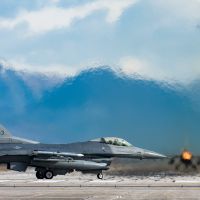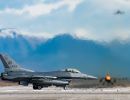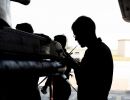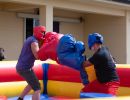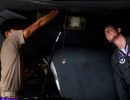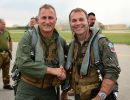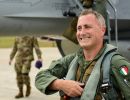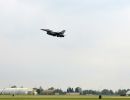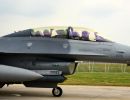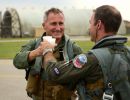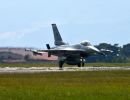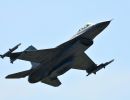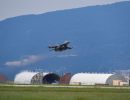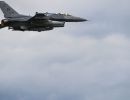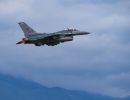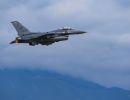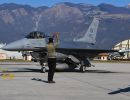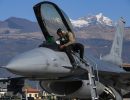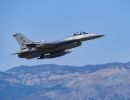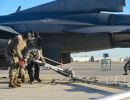-
Several F-16 Fighting Falcons from the 510th Fighter Squadron take-off, March 7, 2017, at Aviano Air Base, Italy. The 510th and 555th Fighter Squadron F-16 Fighting Falcons rely on a secure flightline to perform three to four flights daily. (U.S. Air Force photo by Senior Airman Cory W. Bush)
Airfield management, dirt boys: Manage a concrete weapon
-
A pilot from the 510th Fighter Squadron takes notes while maintenance Airmen explain the upkeep process of an F-16 Fighting Falcon at Aviano Air Base, Italy, Aug. 13, 2020. The 510th FS and 510th Aircraft Maintenance Unit joined together for a Buzzard Unity event to bolster their working relationship. (U.S. Air Force photo by Senior Airman Caleb House)
Birds of a feather host morale event together
-
U.S. Air Force Staff Sgt. Christopher Soldati, 510th Maintenance Unit weapons load crew member, paints a buzzard on a wall at Aviano Air Base, Italy, Aug. 13, 2020. The wall was painted as a morale booster during a Buzzard Unity event. (U.S. Air Force photo by Senior Airman Caleb House)
Birds of a feather host morale event together
-
Airmen from the 510th Fighter Squadron and the 510th Aircraft Maintenance Unit paint a wall at Aviano Air Base, Italy, Aug. 13, 2020. Repainting the wall was part of the Buzzard Unity event which aimed to boost morale and camaraderie. (U.S. Air Force photo by Senior Airman Caleb House)
Birds of a feather host morale event together
-
Airmen participate in an inflatable boxing match during a Buzzard Unity event at Aviano Air Base, Italy, Aug. 14, 2020. Airmen from the 510th Fighter Squadron and 510th Aircraft Maintenance Squadron came together for a two-day event to build morale and improve their working relationships. (U.S. Air Force photo by Senior Airman Caleb House)
Birds of a feather host morale event together
-
U.S. Air Force Staff Sgt. Marco Elbo, 510th Aircraft Maintenance Unit dedicated crew chief, demonstrates F-16 Fighting Falcon maintenance steps to U.S. Air Force 1st Lt. Nathan Meyer, 510th Fighter Squadron pilot, at Aviano Air Base, Italy, Aug. 13, 2020. The 510th FS and 510th Aircraft Maintenance Unit joined together for a Buzzard Unity event to bolster their working relationship. (U.S. Air Force photo by Senior Airman Caleb House)
Birds of a feather host morale event together
-
Italian air force Col. Vincenzo Tozzi, Aviano base commander, left, and U.S. Air Force Lt. Col. Daniel Lindsey, commander of the 510th Fighter Squadron, pose for a photo at Aviano Air Base, Italy, Sept. 17, 2019. Col. Tozzi was Lt. Col. Lindsey’s instructor pilot while they were at Sheppard Air Force Base, Texas, 16 years ago. (U.S. Air Force photo by Staff Sgt. Kelsey Tucker)
From first to final flight
-
Italian air force Col. Vincenzo Tozzi, Aviano base commander, greets friends and family after exiting an F-16 Fighting Falcon at Aviano Air Base, Italy, Sept. 17, 2019. Col. Tozzi was given a flight in an F-16 as a show of gratitude from the 31st Fighter Wing for his time as base commander. (U.S. Air Force photo by Staff Sgt. Kelsey Tucker)
From first to final flight
-
Italian air force Col. Vincenzo Tozzi, Aviano base commander, and U.S. Air Force Lt. Col. Daniel Lindsey, commander of the 510th Fighter Squadron, take off in an F-16 Fighting Falcon at Aviano Air Base, Italy, Sept. 17, 2019. Col. Tozzi was given a flight in an F-16 as a show of gratitude from the 31st Fighter Wing for his time as base commander. (U.S. Air Force photo by Staff Sgt. Kelsey Tucker)
From first to final flight
-
Italian air force Col. Vincenzo Tozzi, Aviano base commander, left, and U.S. Air Force Lt. Col. Daniel Lindsey, commander of the 510th Fighter Squadron, taxi to the runway in an F-16 Fighting Falcon at Aviano Air Base, Italy, Sept. 17, 2019. Col. Tozzi was given a flight in an F-16 as a show of gratitude from the 31st Fighter Wing for his time as base commander. (U.S. Air Force photo by Staff Sgt. Kelsey Tucker)
From first to final flight
-
Italian air force Col. Vincenzo Tozzi, Aviano base commander, left, and U.S. Air Force Lt. Col. Daniel Lindsey, commander of the 510th Fighter Squadron, share a toast at Aviano Air Base, Italy, Sept. 17, 2019. Col. Tozzi was Lt. Col. Lindsey’s instructor pilot while they were at Sheppard Air Force Base, Texas, 16 years ago. (U.S. Air Force photo by Staff Sgt. Kelsey Tucker)
From first to final flight
-
An F-16 Fighting Falcon assigned to the 510th Fighter Squadron taxis on the a flightline at Aviano Air Base, Italy, Aug. 11, 2020. The F-16 Fighting Falcon is a highly maneuverable, compact, multi-role fighter aircraft that has proven itself in air-to-air combat and air-to-surface attacks. The 510th FS is assigned to the 31st Operations Group which prepares fighter pilots, controllers, and support personnel to execute U.S. and NATO war plans and contingency operations. (U.S. Air Force photo by SrA Kevin Sommer)
F-16s Soar Above Aviano
-
An F-16 Fighting Falcon assigned to the 510th Fighter Squadron taxis on the a flightline at Aviano Air Base, Italy, Aug. 11, 2020. The F-16 Fighting Falcon is a highly maneuverable, compact, multi-role fighter aircraft that has proven itself in air-to-air combat and air-to-surface attacks. The 510th FS is assigned to the 31st Operations Group which prepares fighter pilots, controllers, and support personnel to execute U.S. and NATO war plans and contingency operations. (U.S. Air Force photo by SrA Kevin Sommer)
• F-16s Soar Above Aviano
-
A U.S. Air Force F-16 Fighting Falcon from the 31st Operations Group takes flight at Aviano Air Base, Italy, June 25, 2020. In an air combat role, the F-16's maneuverability and combat radius exceeds that of all potential threat fighter aircraft. (U.S. Air Force photo by Airman 1st Class Thomas S. Keisler IV)
Fighting Falcons Take Off From Aviano
-
A U.S. Air Force F-16 Fighting Falcon from the 510th Fighter Squadron flies at Aviano Air Base, Italy, June 25, 2020. The unit performs air and space control and force application roles of counter-air, strategic attack and counter-land, including interdiction and close-air support, with F-16CMs employing state of the art munitions in support of the joint, NATO, and combined operations. (U.S. Air Force photo by Airman 1st Class Thomas S. Keisler IV)
Fighting Falcons Take Off From Aviano
-
A U.S. Air Force F-16 Fighting Falcon from the 510th Fighter Squadron ascends at Aviano Air Base, Italy, June 25, 2020. The F-16 is able to fly more than 500 miles, deliver its weapons with superior accuracy, defend itself against enemy aircraft, and return to its starting point. (U.S. Air Force photo by Airman 1st Class Thomas S. Keisler IV)
Fighting Falcons Take Off From Aviano
-
A U.S. Air Force F-16 Fighting Falcon from the 510th Fighter Squadron soars at Aviano Air Base, Italy, June 25, 2020. The F-16 Fighting Falcon is a compact, multi-role fighter aircraft that is highly maneuverable and has proven itself in air-to-air combat and air-to-surface attack. (U.S. Air Force photo by Airman 1st Class Thomas S. Keisler IV)
Fighting Falcons Take Off From Aviano
-
U.S. Air Force Airman Jaquinton Stewart, crew chief for the 510th Fighter Squadron, marshals a U.S. Air Force F-16 Fighting Falcon prior to take off at Aviano Air Base, Italy, Apr. 7, 2020. The 510th FS provides combat airpower on demand to U.S. and NATO Combatant Commanders as well as the National Command Authority in order to meet National Security objectives. (U.S. Air Force photo by Airman Thomas S. Keisler IV)
510th FS Stays Mission Ready
-
U.S. Air Force Airman Jaquinton Stewart, crew chief for the 510th Fighter Squadron, performs preflight procedures at Aviano Air Base, Italy, Apr. 7, 2020. In alignment with the new decrees put in place by the Italian government, crew chiefs at Aviano continue to ensure that the aircraft in their care is ready to fly at a moment’s notice so that pilots can safely and effectively complete their mission. (U.S Air Force photo by Airman Thomas S. Keisler IV)
510th FS Stays Mission Ready
-
A U.S. Air Force F-16 Fighting Falcon from the 510th Fighter Squadron takes off at Aviano Air Base, Italy, Apr. 6, 2020. The 31st Fighter Wing is dedicated to continuing the mission by remaining lethal and rapidly ready while operating within the parameters of Italian decrees instituted to slow the spread of COVID-19. (U.S. Air Force photo by Airman Thomas S. Keisler)
510th FS Stays Mission Ready
-
U.S. Air Force Airmen from the 31st Fighter Wing refuel a U.S. Air Force F-16 Fighting Falcon at Aviano Air Base, Italy, Jan. 8, 2020. The F-16 is able to fly more than 500 miles, deliver its weapons with superior accuracy, defend itself against enemy aircraft, and return to its starting point. (U.S. Air Force photo by Airman Thomas S. Keisler IV)
F-16 Fighting Falcon


